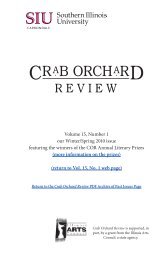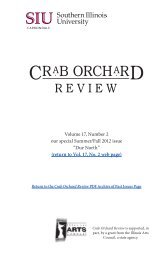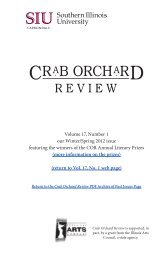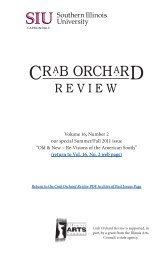Crab Orchard Review Vol. 12, No. 2, our
Crab Orchard Review Vol. 12, No. 2, our
Crab Orchard Review Vol. 12, No. 2, our
You also want an ePaper? Increase the reach of your titles
YUMPU automatically turns print PDFs into web optimized ePapers that Google loves.
Nishta J. Mehra<br />
watching the beautiful seniors sit very still against the bright lights of<br />
the shadowbox. Each year, the senior class and high school faculty elect<br />
six girls to play the part of Mary. It is an honor which carries weight.<br />
The girls playing Mary should be worthy of their role, should have<br />
demonstrated love and compassion and sacrifice during their time at<br />
St. Mary’s. The school motto, “light and life,” should be exemplified in<br />
them. I feel lucky to be able to say my class took that vote very seriously,<br />
beyond a popularity contest. Even though we were big girls, there was<br />
still something about the idea of Mary, full of grace. She who gave birth<br />
to the Savior of Men. She who raised the Son of God.<br />
With this in mind, we voted, and I became the first non-Caucasian,<br />
non Judeo-Christian Mary in school history. Brown Mary, my friends<br />
and classmates called me, lovingly. It felt like a victory, one in which<br />
we all shared, injecting new life into an old tradition, scandalizing the<br />
church ladies a little bit. “Y<strong>our</strong> skin color is probably more historically<br />
accurate than anyone else’s,” my high school history teacher said, and we<br />
arranged for my fellow Hindu, Amrita, to be my Joseph. Behold the holy<br />
family, dark-skinned and authentic. Me, the mother, vehicle, and proud.<br />
I got very sick the night before the pageant, amidst the swirl of<br />
exams and college applications which came with Christmas that year.<br />
It was bronchitis, and the doctor at the minor medical clinic warned<br />
me that it could get worse. “You need to rest, young lady,” he told me. “I<br />
know you won’t mind if I make you stay home from school tomorrow,”<br />
winking, thinking he was doing me a favor. “You don’t understand,” I<br />
protested. “I have to go.” We went back and forth like this for a while;<br />
I think he thought I was crazy. It isn’t easy to explain in five minutes<br />
what twelve years has built inside you. “Okay,” he relented. “I’ll give<br />
you a strong antibiotic and a painkiller. You’re going to have to try to<br />
break y<strong>our</strong> fever—otherwise, you’re still contagious, so no go.”<br />
I slept that night, exhausted and upset. The next morning, I hovered<br />
around 100 degrees, but was adamant that the fever would break. I had<br />
to be at school by noon—that much leeway my principal would give—<br />
the pageant started at two-thirty. My mother wrapped me in blankets,<br />
brought me warm liquids, lemon and honey for my aching throat. She<br />
chanted for me in Sanskrit from the prayer room down the hall and<br />
took my temperature every half-h<strong>our</strong>. “I know better than to argue,”<br />
she sighed. But we were both surprised at how hard I was trying. This<br />
ritual, this honor I had earned, this seeming contradiction, I wasn’t<br />
about to let go. Goddess, mother, Mary, someone. Please. Make me the<br />
vessel, give me y<strong>our</strong> strength. I want to do this.<br />
<strong>Crab</strong> <strong>Orchard</strong> <strong>Review</strong> ◆ 209






